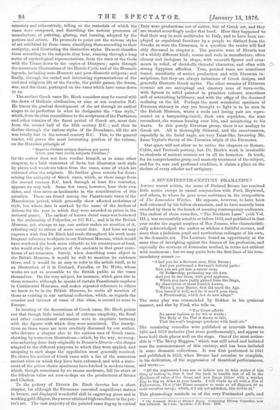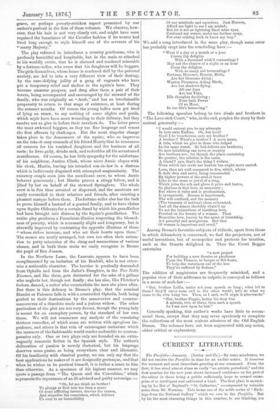A SEVENTEENTH-CENTURY DRAMATIST.* AMONG recent critics, the name of Riehard
Brome has received little notice except in casual conjunction with Ford, Heywood, and others, to whom he gave some assistance in the composition of The Lancashire Witches. He appears, however, to have been well esteemed by his fellow-dramatists, and to have scarcely been excelled by them in the knack of amusing contemporary audiences. The earliest of these comedies, "The Northern Lease" (side Vol. III.), was successfully acted in or before 1632, and published in that year under the august auspices of Ben Jonson, who characteristi- cally acknowledged the author as whilom a faithful servant, and since then a judicious pupil and meritorious colleague of his own, in the dramatic art. The Laureate found an opportunity at the same time of inveighing against the dunces of his profession, and especially the scorners of Jonsonian method, in terms not unblent with coarseness ; but we may quote here the first lines of his com- mendatory sonnet :—
"I had you for a Servant once, Dick Brome;
And you performed a Servant's faithful parts: Now you are got into a nearer room Of Fellowship, professing my old Arts.
And you do doe them, with good applause' Which you have justly gained from the Stags,
By observation of those Comick Lewes, Which I, your Master, first did teach the Age.
You learn'd it well, and for it serv'd your time, A Prenticeship, which few do now adays."
The same play was commended by Dekker in his quaintest manner, and also by Ford, who tells us,
"The Court affords No newer fashion or for wit or words ; The Body of the Plot is drawn so fair, That the soars language quickens with fresh air."
The remaining comedies were published at intervals between 1635 and 1659 inclusive (but some posthumously), and appear to have held their places well on the stage. One of the most notice- able is "The Merry Beggars," which was still acted and imitated near the commencement of this century, and has been included in some dramatic collections. It was first performed in 1641 and published in 1652, when Brome had occasion to complain, in his dedication, of the suppression of theatrical performances, and wrote :—
" AR the arguments I can use to induce you to take notice of this thing of nothing is, that it had the luck to tumble last of all in the Epiclentscall mine of tho Scene, and now limps hither with a wooden Leg, to beg an Alms at your hands. I will winds up all with a Use of Exhortation, That if the Times conspire to make us all Beggars, let us make ourselves merry; which, if I am not mistaken, this drives at."
This phraseology reminds us of the very Puritanical garb, and
• The Dramatic Works of RicAard Drome. Containing Fifteen Comedies, now first collected. In 3 rots, London: J. P. York.
grave, or perhaps poverty-stricken aspect presented by our author's portrait in the firist of these volumes. We observe, how- ever, that his hair is not very closely cut, and might have soon regained the luxuriance of the Cavalier fashion if its wearer had lived long enough to style himself one of the servants of his "merry Majesty."
The play referred to introduces a country gentleman, who is profusely bountiful and hospitable, but in the main so attached to his worldly estate, that he is alarmed and rendered miserable by a fortune-teller, who avers that his daughters will be beggars. The girls themselves, whose home is rendered dull by the paternal anxiety, are led to take a very different view of their destiny, by the care-defying jollity of a gang of vagrants who have got a temporary relief and shelter in the squire's barn. They become amateur paupers, and drag after them a pair of their lovers, being accompanied and encouraged by the steward of the family, who was originally an "Arab," and has an irreclaimable propensity to return to that stage of existence, at least during the summer months. Of course the young ladies soon get tired of lying on straw, to say nothing of some slights and perils, which might have been more wounding to their delicacy, but they resolve not to give in before their cavaliers do. The latter prove the most awkward beggars, as they use fine language and resent the first affronts by challenges. But the most singular change takes place in the demeanour of the squire, who so improves on the take-it-easy counsels of his friend Hearty that he renounces all concern for his vanished daughters and for business of all sorts ; he lives gaily, drinks sack, and redoubles all his accustomed munificence. Of course, he has little sympathy for the misfortune of his neighbour, Justice Clack, whose niece Annie elopes with his clerk, Martin, leaving his intended son-in-law in a distress which is ludicrously disguised with attempted magnanimity. The runaway couple soon join the mendicant crew, to whom Annie -behaves generously ; but Martin proves a stingy fellow, and is jilted by her on behalf of the steward Springlove. The whole crew is in due time arrested or dispersed, and the amateurs are easily reconciled to their relatives and friends, after enacting a pleasant masque before them. The fortune-teller also has the luck to prove himself a bastard of a genteel family, and to have claims upon Squire Oldrents for a certain fraud by which his grandfather lad been brought into distress by the Squire's grandfather. The entire play produces a Franciscan illusion respecting the blessed- ness of poverty, which is necessarily alight and temporary, but is shrewdly improved by contrasting the opposite illusions of those "whose riches increase, and who set their hearts upon them." The scenes are neatly arranged, but owe too often their anima- tion to petty mimicries of the slang and mannerisms of various classes, and in both these traits we easily recognise in Brome the pupil of Ben Jonson.
In the Northern Lasse, the Laureate appears to have been complimented by an imitation of his Boabdil, who is not other- wise a noticeable character. The heroine is poetically descended from Ophelia and from the Jailer's Daughter, in the Two Noble Kinsmen, and like them, gets distracted for the sake of a gallant who neglects her, though not finally ; she has also, like Fletcher's forlorn damsel, a suitor who counterfeits the man she pines after. But there is this delicacy in Brome's play, that the nominal Hamlet or Palemon falls in with a counterfeit Ophelia, both being guided to their destinations by the manceuvres and counter- manceuvres of a dissolute uncle and a jealous widow. The other particulars of the plot are not very decent, though the young lady is meant for an exemplary person, by the standard of her own times. We will not commence any analysis of the remaining
thirteen comedies, of which some are written with egregious im- pudence, and others in that vein of extravagant caricature which the manners of the fashionable world render endurable to contem- poraries only. One or two plays only are founded on an extra- vagantly romantic fiction in the Spanish style. The author's delineation of passion is merely rhetorical, but his language deserves some praise, as being everywhere clear and idiomatic.
Of his familiarity with classical poetry, we can only say that the best applications he makes of it are designedly grotesque, and that when be wishes to be poetical himself, it is rather a snare to him than otherwise. As a specimen of his highest manner, we may quote a passage from "The Queen and the Concubine," which represents the repentance of an ill-advised and guilty sovereign :—
" Oh, let me think no further ! To plunge at first into too deep a sense Of some afflicting terrors, drowns the reason, And stupefies the conscience, which delivers Us over to an insensibility
Of our misdeeds and ourselves. Just Heaven, Afford me light to see I am misled; But let it not as lightning blast mine eyes, Confound my senses, make me further stray, For ever coming back to know my way."
We add a song introduced in the same play, though some error has probably crept into the concluding lines :— "What if a day or a month or a year
Crown thy delights With a thousand wish'd contentings ?
May not the chance of a night or an hour Cross thy delights, With as many sad tormentinga?
Fortune, Honours, Beauty, Birth, Are but blossoms dying; Wanton Pleasures, doting Mirth, Are but shadows flying.
All our Joys Are but Toys, Idle thoughts deceiving ; None bath Power Of an Hour, In our life's bereaving."
The following speeches belong to two rivals and brothers in "The Love-sick Court," who, in the end, perplex the story by their mutual generosity
"I would entreat you be my advocate
In love unto Eudina. Oh, but hold!
Shall I be treacherous ludo my brother?
A brother? What's a brother ? A more name,
A title, which we give to those who lodged
In the same womb. So bed-fellows are brothers; So men inhabiting one town or country Are brothers too ; for though the place containing Be greater, the relation is the same.
A friend ? aye, that's the thing I violate, Than which nor earth nor heaven has aught more sacred.
Love, thou art well compared to fire, which, where It doth obey and servo, being commanded By higher powers of the soul, it fares Like to the stone or jewel of a ring, Which joins the orb and gives it price and lustre, So glorious is that love, so necessary ; But where it rules and is predominant, It tyrannizeth. Reason is imprisoned, The will confined, and the memory (The treasury of notions) clean exhausted, And all the senses slavishly chain'd up To act the injunctions of insulting love, Perched on the beauty of a woman. Thou Masculine love, known by the name of friendship,
Art peaceful and morigerous. But that
Of woman is imperious and cruel."
Among Brome's favourite subjects of ridicule, apart from those in which debauchery is concerned, we find the projectors, not of useful inventions, but of monopolies and pretexts for taxation, such as the Stuarts delighted in. Thus the Court Beggar entertains
"a new project
For building a new theatre or playhouse Upon the Thames, in barges or fiat-boats, To help the watermen out of the loss They've suffered by Sedans."
The oddities of magistrates are frequently mimicked, and a popular view of their addresses to culprits is conveyed as follows in a scene of mob-law :—
" But, brother Lollis, make not your speech so long ; what is't to
them ? they'll carry none on't the other world; let's do what we came to do, e'en hang 'em. Then, as I said, we'll argle it afterwards." "But, brother Poggis, better his they live A minute, two, or three, than such a speech As lam now upon be lost."
Generally speaking, this author's works have little to recom- mend them, except that they may serve speciously to complete the collections of the most zealous admirers of the Old English Drama. The volumes have not been augmented with any notes, either critical or explanatory.



































 Previous page
Previous page